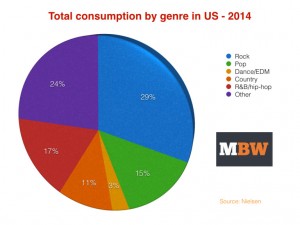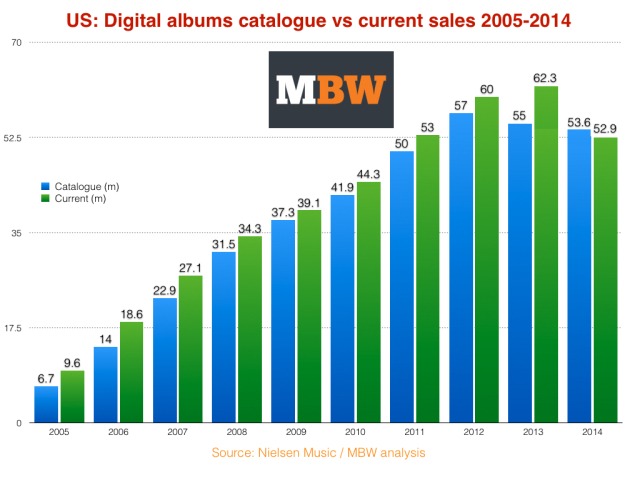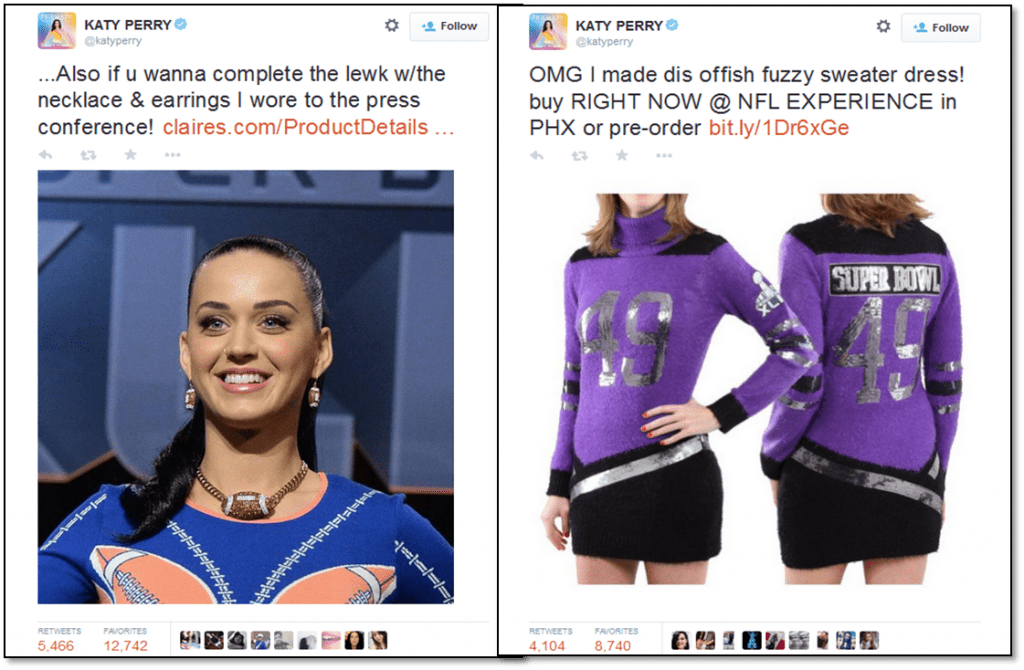You might not have known it from last night’s spectacular halftime performance in “The Big Game,” but Katy Perry has some major issues to sort through. So does Ed Sheeran, Sam Smith, and Ariana Grande. (Maybe not Taylor Swift.)
That’s because something statistically scary happened in 2014 that has never happened before since that advent of digital music. And if you’re a pop star, you may be forced to go the Katy Perry route and focus more on concerts and merch.
It turns out that last year, old albums actually outsold current releases on iTunes in the U.S. A report by Music Business Worldwide confirms it, and the source of this data is none other than Nielsen. While both the sales of catalogue and newer albums both dropped in 2014, the biggest falloff was in the new stuff.
The staying power of older material – OK, let’s just call it Classic Rock – is evidenced by the way that albums that are decades old can make return engagements on the iTunes charts. A case in point mentioned by The Classic Rock/Team Rock group is Tom Petty & the Heartbreakers’ Greatest Hits album. Originally released in 1993, it is inexplicably in the iTunes Top 100.
If you’re surprised by this news and wonder how album sales are slipping for today’s hottest artists, it’s probably because we are so inundated with news, gossip, and television appearances by today’s wave of pop superstars that it’s easy to overlook the fact that even when it comes to actual listening, rock trumps pop.
That’s right, because last month, Nielsen also reported that in America, rock music is twice as popular as pop. You’re reading that stat correctly. Once again, this was reported by Music Business Worldwide who made the point that across total consumption – album and track purchases, as well as streaming – rock music dominated.
 So why don’t we know more about this in the world of radio, and why isn’t this information being factored into format and strategic conversations and meetings?
So why don’t we know more about this in the world of radio, and why isn’t this information being factored into format and strategic conversations and meetings?
The industry is often so fixated with Hot, Amp, and Now formats that it’s easy to forget the power of new and old rock music in American culture. It’s also obvious that so much of what we read and hear about music comes out of New York City, Los Angeles, and Nashville – three markets that are especially non-representative of music tastes throughout the rest of the country.
So as you watched Katy Perry and guests work their magic during halftime last night in Phoenix, don’t forget where her most important performance was really taking place. It was on YouTube, Twitter, Shazam, and connected TV devices from Roku to LG sets as she skillfully hawked her limited edition products. According to Variety, Perry’s fans were able to buy branded items using Twitter’s new “Buy Now” feature, in conjunction with partners Pepsi and Visa. Shazam and Perry’s Vevo channel on YouTube (nearly 15 million subscribers) also served as digital kiosks to sell her merch.
And that’s not to mention her 64 million Twitter followers at @katyperry who were being sold everything from jewelry to clothing. And then there’s her more than 77 million “likes” on Facebook. Those numbers are sure to grow after last night’s extravaganza.
So as the TV ratings for her halftime spectacular are released today, you better believe that Perry’s management team, as well as her interactive commerce unit, Delivery Agent, will be looking at a different set of metrics – the sale of these Katy Perry branded products – because that’s where the real money is being made.
The music wheels are turning, and while some say they’re moving in a retro direction, fans are voting with their feet and their mobile devices – away from buying music and rapidly moving toward concerts, merchandise, and the power of partnerships and the social space.
Katy Perry’s team has read the writing on the wall, and is shifting their business model to commerce reservoirs she can manage and control, especially with social media platforms.
Tom Petty may have an edge with his catalogue sales, but chances are good he’s not outselling Katy Perry when it comes to fuzzy sweater dresses.
- What To Do If Your Radio Station Goes Through A Midlife Crisis - April 25, 2025
- A 2020 Lesson?It Could All Be Gone In A Flash - April 24, 2025
- How AI Can Give Radio Personalities More…PERSONALITY - April 23, 2025







We already know fewer people are BUYING music…but more people are LISTENING to it. When you can see any song on YouTube or stream it on demand, why buy it? Radio curates and introduces new music to the audience and that may be our ONLY successful music format in the future. It’s time for radio to sell its own products and services.
Chip, you’ve hit on one of the major factors that are driving this chart – more and more consumers would rather than rent (or borrow) the music, rather than buy it. Just as artists like Katy Perry have had to refine (or blow up) their business model, radio is in need of a reassessment as well, as you point out. Thanks for the comment and perspective.
At some point, music may evolve into a loss leader for merchandise, concert tickets and value add features. Its getting there already – if digital sales are down and revenue from streaming isn’t coming close to replacing it for the artists, that train may have already left the station.
And if people are buying less music, then the record labels are right on one level – radio is selling less of it…not because its less effective as a promo vehicle, but because increasing numbers of people prefer to rent a song (rather than buy) after they hear it.
Artists have always made the bulk of their money from touring and merchandise – eventually most may become all. That will force the record labels to become an artist vertical marketing system, rather than a music marketing system. And under this scenario, radio might either have to jump into that vertical somehow, or end up paying a performance royalty.
That all sounds interesting and plausible, except that Radio and Records are both sectors that are notoriously slow to adapt and consider changes to their established business models. This could get ugly before it sorts itself out.
Disruption creates wiwnners and losers. Apple and Spotify have reaped the benefits – although now even Apple has come to the realization that selling music in iTunes is not what it used to be, and that streaming platoforms like Beats Music have to be developed and grown. Some of this process comes down to the fear of moving forward into new opportunities even if it means that cash cows (iPods, for example) will suffer in the process. Industries that research, innovate, and adapt are in position to scale and grow. Those that don’t….
Thanks as always, Bob.
It’s just the same old adage again … Petty can sell us steak, but Perry is marketing the sizzle.
And doing it very well. Thanks, Jim.